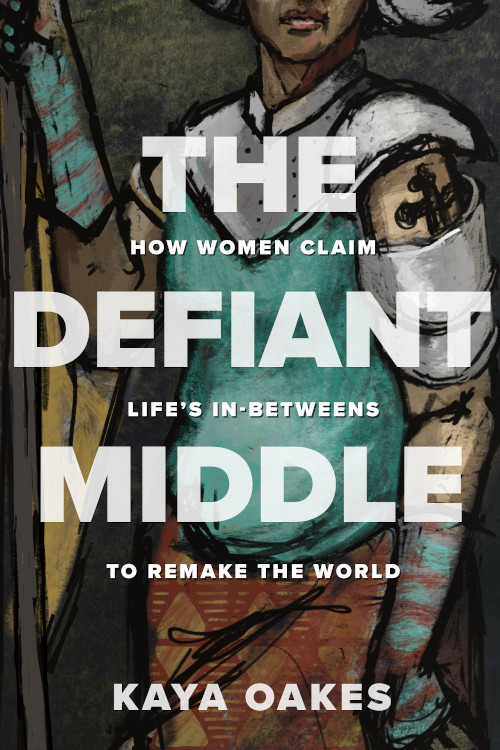Young women from London join a protest during a Day of Action at the U.N. Climate Change Conference Nov. 6 in Glasgow, Scotland. (CNS/Courtesy of CAFOD/Louise Norton)
In the powerful new book, The Defiant Middle, How Women Claim Life's In-Betweens to Remake the World, author Kaya Oakes introduces us to a number of women as they journey through life's different stages in a world that is not always committed to women's empowerment.
Oakes explores themes of cultural formation, expectation, gender, faith and ultimately transformation and accesses a rich record of varied women and life experiences and situations. By highlighting women who confronted and dismantled barriers, like American activist, author and Episcopalian priest Pauli Murray, the author offers an inspirational depiction of women who were unapologetically themselves.

The Defiant Middle offers wisdom and insight while asking — and answering — many questions about the lives of women of "a certain age."
From the beginning, the book offers descriptions of women going beyond a "ripe" age into early middle age and beyond. This sets the landscape for the reader's journey, including Catholic women who are wrestling with the realization that being the youngest woman in church might not mean you are young at all. This netherworld of no longer youthful but not yet being a senior often reveals a place many women occupy, one in which many women feel as if we do not fit in at all.
This is even more pronounced in Oakes' Catholic background, where so many of us are taught about a pliant and obedient Mary. That image becomes harder to understand or accept as our own lives march on and shape us into multi-dimensional humans who are not necessarily meek, mild or rule bound. As Oakes describes in her book, this can often be a transformation that allows us to reimagine Mary's image and see her in a new and more powerful light.
Throughout the book, Oakes clearly makes a case for courageous and necessary boldness without apology. The word "defiant" in the title might elicit discomfort from some who think of defiant as uncooperative or unseemly. For many women, not living up to cultural expectations is indeed a form of defiance, and rejecting those expectations is considered either brave or reckless, depending on your point of view.
Advertisement
When women make bold choices, they are often told they are contrary, messy, unstable or simply "too much." Obedience is held aloft as a positive value, tamping down self-expression. Issues of faith get muddy when discernment points us one way and convention another. From Margery Kempe to St. Catherine of Siena to St. Dymphna, we are introduced to those who made their own way. How are women to face the challenge of living authentically and to be transformed? If women are in fact divinely created equal, there must be another way. As Oakes writes, "… we still remain caught in the middle, between expectations of how we should live and our lived reality."
The author also explores a topic often ignored in Catholic spaces, women's fertility, in the chapter called "Barren." In a world and a church oriented to women bearing children, those like the author, who are childless, don't always fit the mold. Oakes forces us to ask: What does it mean to be barren and what does barren even mean? How does the shame attached to women who are childless shape us into the human beings that we are? Through skillful writing and research, she offers examples of what it means to be family, either biological or through choice and disturbs the roots of patriarchy by challenging the notions of who or what it means to be a mother.
Oakes highlights women like Julian of Norwich, Hildegard von Bingen, Simone Weil, Dorothy Day and St. Joseph Sr. Elizabeth Johnson. These are women who are subversive, who, as Benedictine Sr. Joan Chittister writes, are "defecting in place." The Defiant Middle also features scriptural and fictional women as well, like Queen Esther from the Bible and Anna Madrigal from Armistead Maupin's Tales of the City. Queen Esther looked like she was playing along with the system, but boldly freed her people. Anna Madrigal appeared to be a kind and eccentric woman, which she both was and wasn't. What we see on the surface might not reveal the depths within for any woman. Each of these women experienced their own sexist and misogynistic obstacles when trying to do their work and ministry, yet despite this, they persevered and can serve as inspiration for the rest of us.
Members of the National Council of Catholic Women pray during Mass at the Crystal Gateway Marriott Aug. 26 in Arlington, Virginia. The national gathering marked the 100th anniversary of the National Council of Catholic Women. (CNS/Catholic Standard/Andrew Biraj)
How are women to face the challenge of living authentically and to be transformed? If women are in fact divinely created equal, there must be another way.
This book is also an intergenerational account and includes younger women like Greta Thunberg and Malala Yousafzai. This foundation builds as she explores other young women who made their mark, like Joan of Arc who was seen more as sinner in her own time than saint. These young women show the world that age in years is not necessary for boldness or leadership. By including these voices, Oakes invites all readers, including Catholic ones, to make room for intergenerational dialogue and community building.
The Defiant Middle is a provocative book that will feed hearts and minds with questions and answers. Simultaneously it will challenge the cultural and religious norms that put women in bondage. Living into new ways of being await us all — if we listen deeply and then act.
During this time of profound and ongoing cultural shifts in the church and world, this book can be both a guide and a solace to women. For men, it offers some insight to the often unseen or unnoticed lives of women. No matter who the reader is, one thing seems certain, you will be moved by its compelling message, one which compels us to know who we are and to grab hold of whoever we might truly be.
For women and men who seek depth and insight, The Defiant Middle stands on high ground.








